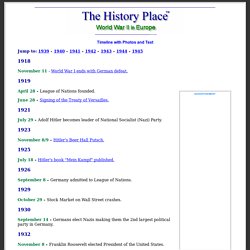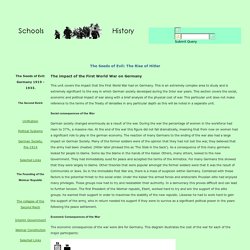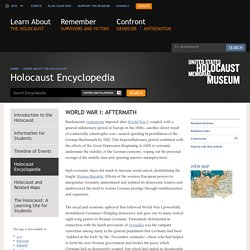

Timeline of Events - Before 1933 — United States Holocaust Memorial Museum. World War II History - World War II. In North Africa, British and American forces had defeated the Italians and Germans by 1943.

An Allied invasion of Sicily and Italy followed, and Mussolini’s government fell in July 1943, though Allied fighting against the Germans in Italy would continue until 1945. On World War II’s Eastern Front, a Soviet counteroffensive launched in November 1942 ended the bloody Battle of Stalingrad, which had seen some of the fiercest combat of the war. The approach of winter, along with dwindling food and medical supplies, spelled the end for German troops there, and the last of them surrendered on January 31, 1943. On June 6, 1944–celebrated as “D-Day”–the Allied began a massive invasion of Europe, landing 156,000 British, Canadian and American soldiers on the beaches of Normandy, France.
In response, Hitler poured all the remaining strength of his army into Western Europe, ensuring Germany’s defeat in the east. World War II in Europe Timeline. Jump to: 1939 - 1940 - 1941 - 1942 - 1943 - 1944 - 1945 1918 November 11 - World War I ends with German defeat. 1919 April 28 - League of Nations founded.

June 28 - Signing of the Treaty of Versailles. 1921 July 29 - Adolf Hitler becomes leader of National Socialist (Nazi) Party. 1923 November 8/9 - Hitler's Beer Hall Putsch. 1925 July 18 - Hitler's book "Mein Kampf" published. 1926 September 8 - Germany admitted to League of Nations. 1929 October 29 - Stock Market on Wall Street crashes. 1930 September 14 - Germans elect Nazis making them the 2nd largest political party in Germany. 1932 November 8 - Franklin Roosevelt elected President of the United States. 1933 January 30 - Adolf Hitler becomes Chancellor of Germany. February 27 - The German Reichstag burns. March 12 - First concentration camp opened at Oranienburg outside Berlin. March 23 - Enabling Act gives Hitler dictatorial power.
April 1 - Nazi boycott of Jewish owned shops. World War II: Timeline. September 18, 1931Japan invades Manchuria.

October 2, 1935–May 1936Fascist Italy invades, conquers, and annexes Ethiopia. October 25–November 1, 1936Nazi Germany and Fascist Italy sign a treaty of cooperation on October 25; on November 1, the Rome-Berlin Axis is announced. November 25, 1936Nazi Germany and Imperial Japan sign the Anti-Comintern Pact, directed against the Soviet Union and the international Communist movement. July 7, 1937Japan invades China, initiating World War II in the Pacific. March 11–13, 1938Germany incorporates Austria in the Anschluss. September 29, 1938Germany, Italy, Great Britain, and France sign the Munich agreement which forces the Czechoslovak Republic to cede the Sudetenland, including the key Czechoslovak military defense positions, to Nazi Germany. March 14–15, 1939Under German pressure, the Slovaks declare their independence and form a Slovak Republic.
The impact of the First World War on Germany. The impact of the First World War on Germany This unit covers the impact that the First World War had on Germany.

This is an extremely complex area to study and is extremely significant to the way in which German society developed during the Inter war years. This section covers the social, economic and political impact of war along with a brief analysis of the physical cost of war. This particular unit does not make reference to the terms of the Treaty of Versailles in any particular depth as this will be noted in a separate unit. World War I: Aftermath. Burdensome reparations imposed after World War I, coupled with a general inflationary period in Europe in the 1920s—another direct result of a materially catastrophic war—caused spiraling hyperinflation of the German Reichsmark by 1923.

This hyperinflationary period combined with the effects of the Great Depression (beginning in 1929) to seriously undermine the stability of the German economy, wiping out the personal savings of the middle class and spurring massive unemployment. Such economic chaos did much to increase social unrest, destabilizing the fragile Weimar Republic. Efforts of the western European powers to marginalize Germany undermined and isolated its democratic leaders and underscored the need to restore German prestige through remilitarization and expansion. The social and economic upheaval that followed World War I powerfully destabilized Germany's fledgling democracy and gave rise to many radical right wing parties in Weimar Germany.